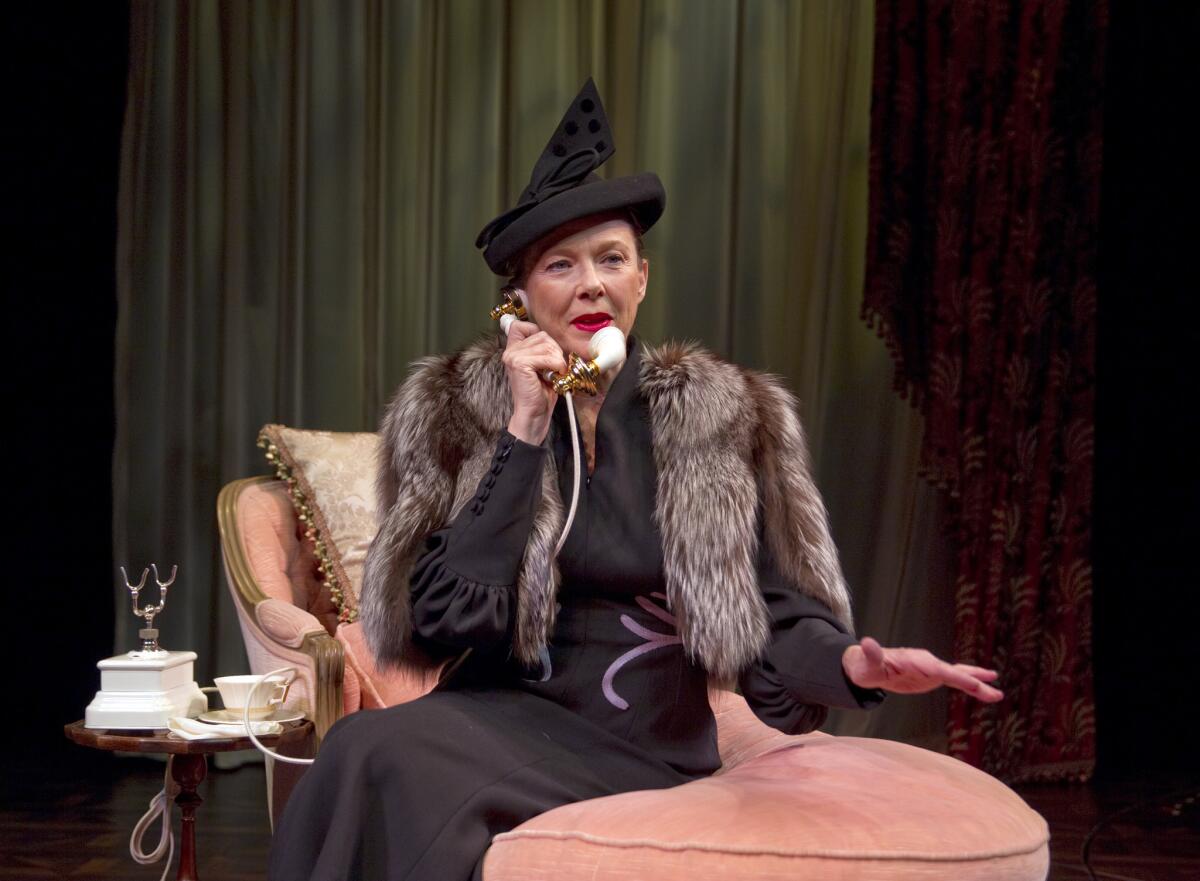Review: Annette Bening pays fine tribute in ‘Ruth Draper’s Monologues’

Watching Annette Bening perform the monologues of Ruth Draper at the Geffen Playhouse put me in mind of that lovely music tradition born out of reverence for the past: the tribute album.
One doesn’t expect a replica on these recordings — no two voices are ever the same. And part of the interest is seeing how one sensibility interprets another, how the greatness of the original is illuminated by the talent of the one paying homage. The rewards of these offerings naturally depend as much on the performance as on the auditor’s expectations.
With this bill of four vignettes, straightforwardly titled “Ruth Draper’s Monologues,” Bening provides more than satisfying compensation. Her work glows with subdued charm.
PHOTOS: Arts and culture in pictures by The Times
A theatrical soloist whose influence has surpassed her fame, Draper (1884-1956) may have largely faded from memory, but she counted among her admirers such luminaries as Henry James, John Gielgud and Uta Hagen. And through her recordings she has inspired generations of artists, including Lily Tomlin, John Lithgow and Simon Callow.
Monologues were her métier. Her mode, however, wasn’t the radical self-exposure of today’s solo performers. Rolling around naked in chocolate sauce à la Karen Finley would have been unthinkable for the well-born Draper, who achieves her effects more subtly, armed with a scalpel-like literary intelligence and an intuitive capacity to balance parody with realism.
There’s a novelistic quality of patient observation to her work. Her sketches blend slice-of-life portraiture with gentle satire. As much a psychologist as a sociologist, she firmly plants her characters within their social context. Personal manner clasps hands with mores.
“The richness of [Draper’s] style lies in its quietness,” observed British theater critic Kenneth Tynan, and it’s this quality that Bening so admirably preserves in a selection of work that rallies around a central irony: the stark division between the idealistic visions we have of ourselves and the hypocritical human truth that’s always asserting itself.
Bening, who has graced L.A. stages in Chekhov, Ibsen and Euripides, doesn’t use the occasion for a star turn. There’s a modesty to her performance that doesn’t overplay the comedy at the expense of the characters. She gives to each figure a measure of dignity even when they’re being more than a little ridiculous.
CRITICS’ PICKS: What to watch, where to go, what to eat
Take the aristocratic matriarch of “The Italian Lesson,” one of Draper’s most famous works. A society woman with a ludicrously overscheduled life, she finds time in the morning for studying “The Divine Comedy” of Dante but progresses no further than the opening sentence (preferring, of course, her own translation): “Midway along the pathway of our life, I found myself in a dark forest because the direct way was lost.”
“To think that those lines were written hundreds and hundreds of years ago and yet they are so applicable to life today,” she exclaims to her visiting teacher, never for a second suspecting that the barrage of interruptions (from a constantly ringing telephone to a parade of servants and children) preventing her from making any headway with the poem might be her own middle-aged “dark forest.”
This grande dame may be dressed in a feather-trimmed pink dressing gown and sprawled on a chaise longue, but she’s more formidable than a brigadier general. She tells her son’s teacher that mathematics is causing her boy too much stress and therefore must be discontinued. An artist who has painted a portrait of her daughter receives a list of “suggestions” she’d liked to see implemented to make the work “more becoming.”
Yet this peremptory character is no simple gargoyle. Draper allows the audience to make discoveries without spelling out that madam is trapped in a loveless marriage and conducting an affair between her bible class and hospital fundraising duties. And Bening, who has directed herself on a spare set with space at the back for her to change costumes, plays her with just enough sympathetic humor.
PHOTOS: Hollywood stars on stage
Draper has faith in the alertness of theatergoers to deduce that the gathering in “A Class in Greek Poise” is a disguised weight reduction meeting. Characters in her monologues are always impressively adept at concealing things from themselves, as with the young woman in “A Debutante at a Dance” who can’t stop talking high-mindedly about character and discipline yet melts instantly at the slightest hint of romance. And just wait till you see what the bossy dieter lunching with her lady friends winds up ordering in “Doctors and Diets” — it’s the punch line that drives home the bill’s overarching point about the pretense of the over-privileged.
Performed consecutively and without intermission, these monologues make exhausting demands on Bening’s memory and concentration. (Draper allowed herself the freedom of ad-libbing.) They aren’t easy to sustain, and the interest occasionally flags here. Distracted theatergoers might mistake them for being old-fashioned. But though the characters do indeed belong to another era, the themes they touch on are eternal.
Bening has a wonderfully rich and supple voice, but Draper could do astonishing things with hers, including speaking in a variety of tongues. (No one has ever captured national essences through intonation better.) There are no opportunities for Bening to show off this kind of virtuosity, but she’s not quite as forceful as Draper in revealing a new soul every time a character engages a different interlocutor.
But what she does do with beautiful discretion in this salute to a master is shed light on the human comedy that makes lovable hypocrites of us all.
-----------------------------------
‘Ruth Draper’s Monologues’
Where: The Geffen Playhouse, 10866 Le Conte Ave., L.A.
When: 8 p.m. Tuesdays through Fridays, 3 and 8 p.m. Saturdays, 2 and 7 p.m. Sundays. Ends May 18.
Tickets: $37 to $77
Contact: (310) 208-5454 or https://www.geffenplayhouse.com
Running time: 1 hour, 30 minutes
More to Read
The biggest entertainment stories
Get our big stories about Hollywood, film, television, music, arts, culture and more right in your inbox as soon as they publish.
You may occasionally receive promotional content from the Los Angeles Times.











